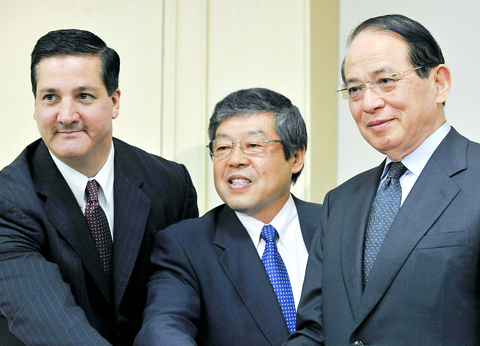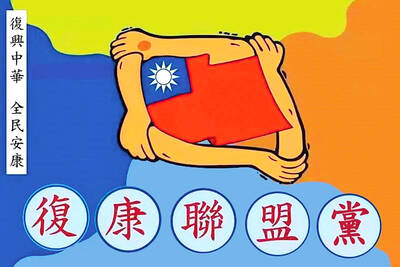Japanese lenders Shinsei and Aozora, which have been hit hard by the global financial crisis, announced yesterday a planned merger that would create the nation’s sixth biggest commercial bank.
The two companies said in a joint statement that they had agreed to a merger of equals that is expected to take effect by October next year.
They said Norito Ikeda, a former banking executive who is now an adviser to management consultants A.T. Kearney K.K., would become president and chief executive of the combined group.

PHOTO: BLOOMBERG
“The merger is expected to create an independent financial institution and a platform that will deliver long-term, stable and sustainable earnings, providing value to all stakeholders,” the statement said.
The name of the enlarged bank has not yet been decided but the two lenders said that Shinsei would continue to exist while Aozora would be dissolved.
The banks, both backed by US investment funds, are struggling to find a niche in the face of a weak economy and financial markets, as well as growing competition with larger rivals.
Shinsei, which is about one-third owned by US buyout firm JC Flowers & Co, has been hit hard by the global credit crunch and last year said it would sell its Tokyo headquarters for more than US$1 billion.
Aozora, which is roughly half owned by US investment fund Cerberus, has fallen deep into the red because of exposure to failed Wall Street giant Lehman Brothers, troubled auto finance giant GMAC and other bad investments.
The two lenders were bailed out with public money during Japan’s 1990s banking crisis and later sold to private investors. Both remain partly owned by the Japanese government.

AIR DEFENSE: The Norwegian missile system has proved highly effective in Ukraine in its war against Russia, and the US has recommended it for Taiwan, an expert said The Norwegian Advanced Surface-to-Air Missile Systems (NASAMS) Taiwan ordered from the US would be installed in strategically important positions in Taipei and New Taipei City to guard the region, the Ministry of National Defense said in statement yesterday. The air defense system would be deployed in Taipei’s Songshan District (松山) and New Taipei City’s Tamsui District (淡水), the ministry said, adding that the systems could be delivered as soon as the end of this year. The US Defense Security Cooperation Agency has previously said that three NASAMS would be sold to Taiwan. The weapons are part of the 17th US arms sale to

SERIOUS ALLEGATIONS: The suspects formed spy networks and paramilitary groups to kill government officials during a possible Chinese invasion, prosecutors said Prosecutors have indicted seven retired military officers, members of the Rehabilitation Alliance Party, for allegedly obtaining funds from China, and forming paramilitary groups and assassination squads in Taiwan to collaborate with Chinese troops in a possible war. The suspects contravened the National Security Act (國家安全法) by taking photos and drawing maps of key radar stations, missile installations and the American Institute in Taiwan’s headquarters in Taipei, prosecutors said. They allegedly prepared to collaborate with China during a possible invasion of Taiwan, prosecutors said. Retired military officer Chu Hung-i (屈宏義), 62, a Republic of China Army Academy graduate, went to China

INSURRECTION: The NSB said it found evidence the CCP was seeking snipers in Taiwan to target members of the military and foreign organizations in the event of an invasion The number of Chinese spies prosecuted in Taiwan has grown threefold over a four-year period, the National Security Bureau (NSB) said in a report released yesterday. In 2021 and 2022, 16 and 10 spies were prosecuted respectively, but that number grew to 64 last year, it said, adding that the Chinese Communist Party (CCP) was working with gangs in Taiwan to develop a network of armed spies. Spies in Taiwan have on behalf of the CCP used a variety of channels and methods to infiltrate all sectors of the country, and recruited Taiwanese to cooperate in developing organizations and obtaining sensitive information

BREAKTHROUGH: The US is making chips on par in yield and quality with Taiwan, despite people saying that it could not happen, the official said Taiwan Semiconductor Manufacturing Co (TSMC, 台積電) has begun producing advanced 4-nanometer (nm) chips for US customers in Arizona, US Secretary of Commerce Gina Raimondo said, a milestone in the semiconductor efforts of the administration of US President Joe Biden. In November last year, the commerce department finalized a US$6.6 billion grant to TSMC’s US unit for semiconductor production in Phoenix, Arizona. “For the first time ever in our country’s history, we are making leading edge 4-nanometer chips on American soil, American workers — on par in yield and quality with Taiwan,” Raimondo said, adding that production had begun in recent